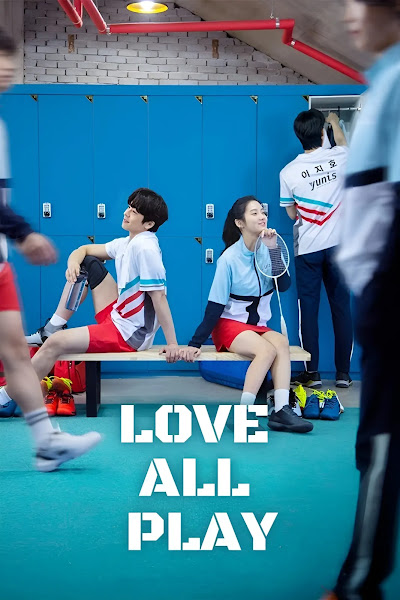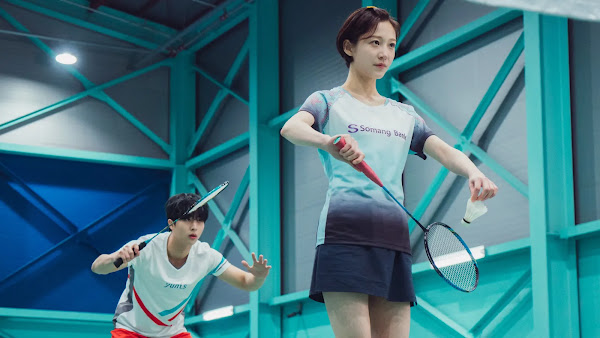Search This Blog

Welcome to my blog, where we explore the rich tapestry of Korean content on OTT—from deeply moving dramas to captivating films—all while diving into the broader landscape of Korean culture. Whether you’re a seasoned K-drama fan or a newcomer eager to discover the cinematic gems, this is your space to find heartfelt reviews, thoughtful insights. Get ready to embark on a journey that celebrates the stories, characters, and traditions that make Korean entertainment so universally compelling!
Featured
'Love All Play' is a heartfelt sports romance K-drama blending badminton, identity, and healing love through resilience.
Why “Love All Play” Scores Big in Sports Romance
Introduction
Have you ever felt your world shrink because of one game, one moment? I felt that when Park Tae‑yang and Park Tae‑joon stepped onto the court—two 25‑year‑olds whose entire lives revolve around badminton. “Love All Play” isn’t just a sports romance—it’s a pulse‑racing journey through dreams, rivalry, and the emotional strain of chasing ambition. Every smash and every stolen glance felt intimately real. This series grips your heart from the first rally.
Overview
Title: Love All Play (너에게 가는 속도 493KM)
Year: 2022
Genre: Sports Drama, Romance
Main Cast: Park Ju‑hyun, Chae Jong‑hyeop, Park Ji‑hyun, Kim Mu‑jun, Seo Ji‑hye
Episodes: 16
Runtime: ~70 min each
Streaming Platform: KBS2, Disney+
Overall Story
Park Tae‑yang (Park Ju‑hyun) is a former badminton prodigy fighting to regain her spark after a three‑year hiatus due to injury. Returning to Team Yunis at 25, she faces both physical and emotional challenges—the court that once energized her now feels like uncharted territory. Her resilience and unwavering passion for the game are tested, echoing the theme of career resilience as she reclaims her identity.
Park Tae‑joon (Chae Jong‑hyeop), her doubles partner and former rival, treats badminton as a job. His pragmatic approach—sparked by financial pressure and uncertainty—clashes with Tae‑yang’s heart. Their relationship becomes a compelling dance between professional ambition and personal growth, as both struggle to redefine themselves through sport.
Park Jun‑young (Park Ji‑hyun), a retired Olympian, joins the team as a mentor‑turned-player, adding emotional depth that explores generational wisdom. Her presence forces Tae‑yang and Tae‑joon to confront past failures and evolving goals, creating a narrative that balances youthful energy with seasoned insight on the court.
Supporting characters like Yook Jeong‑hwan and Lee Yoo‑min navigate sponsorship deals, team politics, and personal relationships—offering a backdrop of team dynamics that feel both competitive and collaborative. These side stories highlight the emotional toll of professional sports beyond the matches themselves.
Matches aren’t just about points—they’re emotional battlegrounds. Whether Tae‑yang and Tae‑joon are facing a comeback after injury or learning to sync as partners, each rally reflects trust, ambition, and the raw power of sport to heal or fracture dreams.
Ultimately, “Love All Play” is more than a romance or a sports narrative—it’s a story of two people learning that sometimes your biggest victories come off the court, when you learn to believe in yourself and each other.
Over sixteen moving episodes, Love All Play reminds us that both love and badminton require courage, and that healing sometimes comes at the speed of 493 km/h—a smash that mends what was broken.
Highlight Moments / Key Episodes
Episode 1: Tae‑yang returns to the court, her first smash landing with trembling confidence—a powerful emotional reset for the series.
Episode 4: Tae‑joon openly criticizes her strategy mid‑game, leading to tension that reveals their clashing ambitions.
Episode 7: Jun‑young steps back into competition, mentoring Tae‑yang—showing how experience and heart can reshape performance.
Episode 10: The pair manages their first shaky but promising mixed doubles match, igniting hope and deeper connection.
Episode 16: Final match sees Tae‑yang and Tae‑joon blaze across the court—victory isn’t just about points, it’s about unity and renewed dreams.
Memorable Lines
"My heart races faster than any shuttlecock." – Park Tae‑yang, Episode 2 Her metaphor captures the thrill of competition and emotional stakes tied to sport.
"Speed means nothing if you run alone." – Park Tae‑joon, Episode 5 A turning point that challenges his lone‑wolf mentality and hints at emerging partnership.
"Experience isn’t a crutch—it’s a roadmap through the hardest rallies." – Park Jun‑young, Episode 8 Imparts wisdom that reshapes Tae‑yang’s approach to matches and life.
"We win together, or we fall alone." – Coach Lee Tae‑sang, Episode 12 A motivational truth about teamwork and pressure in sports.
"Badminton taught me how to trust—and how to let go." – Park Tae‑yang, Episode 16 Her reflective admission brings emotional closure, emphasizing growth and reconciliation.
Why It’s Special
Love All Play shines because it’s more than just a sports or romance drama—it’s a heartfelt meditation on resilience, teamwork, and self‑belief. Unlike many K‑dramas that gloss over the grit of athletic life, this series captures the sweat, pain, and quiet triumphs of athletes chasing their dreams. Every shuttlecock and sidelong glance between Tae‑yang and Tae‑joon carries emotional weight, making each rally as thrilling as it is intimate.
Park Ju‑hyun (Park Tae‑yang) breathes life into a character who radiates determination and vulnerability in equal measure. Chae Jong‑hyeop (Park Tae‑joon) delivers a layered performance, growing from a detached player into a supportive partner. Their evolving chemistry not only fuels the romantic tension but also makes the badminton matches feel alive with stakes that go beyond the scoreboard.
The drama excels at showing career resilience—how Tae‑yang claws back from injury and disgrace, and how Tae‑joon overcomes his cynicism. Their journey makes viewers reflect on their own moments of doubt and the courage required to stand back up. It also explores professional ambition with nuance, portraying the fine line between healthy competition and destructive pressure.
Visually, the series is breathtaking—lighting that bathes the court in golden glow, slow‑motion shots that capture both the grace and brutality of the sport, and costume design that subtly reflects character growth. The attention to detail grounds you in the reality of elite sports without losing the dreamlike beauty of K‑drama storytelling.
Park Ji‑hyun’s Jun‑young adds a thoughtful dimension through her generational wisdom, showing that success isn’t just measured in medals but in mentorship and integrity. Her quiet strength and mentorship scenes anchor the drama’s message of support and legacy.
Ultimately, Love All Play is special because it reminds us that even at our lowest speeds, we can still find someone who matches our rhythm and believes in us. That message lingers long after the final match ends.
Popularity & Reception
When Love All Play debuted in 2022, it immediately resonated with viewers looking for more authentic portrayals of sports and romance. Its mix of heartfelt character arcs and dynamic match sequences drew fans who appreciated its fresh take on K‑drama conventions.
Critics noted its ability to depict badminton as more than a backdrop, calling it “a love letter to ambition and teamwork.” Fans especially praised the series for shining a light on the emotional challenges of athletes often overlooked in favor of glamorous victory shots.
Park Ju‑hyun won acclaim for her athleticism and emotional depth, proving she could convincingly embody both the intensity of a player and the fragility of someone who has suffered loss. Chae Jong‑hyeop became a breakout star thanks to his charismatic and nuanced performance.
On social media, hashtags like #LoveAllPlay, #BadmintonRomance, and #TaeYangTaeJoon frequently trended, with viewers sharing GIFs of matches, training montages, and quiet moments of trust between the leads.
Cast & Fun Facts
Park Ju‑hyun (Park Tae‑yang) undertook rigorous training with professional badminton coaches, perfecting footwork, racket handling, and even breathing patterns to deliver authenticity on court. She was praised by real athletes for her convincing gameplay.
She revealed that wearing actual tournament‑grade uniforms and shoes made her feel like a true athlete, helping her embody Tae‑yang’s emotional and physical journey more fully.
Chae Jong‑hyeop (Park Tae‑joon) prepared by watching countless doubles matches to learn subtle partner communication. His dedication paid off, with his timing and strategy earning praise from production staff and sports fans alike.
On set, Chae and Park were known to rehearse long rallies between takes, building real‑life chemistry that translated beautifully on screen.
Park Ji‑hyun (Park Jun‑young) met with retired Olympians to capture the quiet dignity and emotional weight of a former champion mentoring younger players. Her scenes often resonated most with viewers who had experienced mentorship themselves.
Director Jo Woong employed real national‑level coaches as advisors and choreographed match scenes to ensure accuracy, even filming during live tournaments for added authenticity.
One amusing incident occurred when a shuttlecock ricocheted off‑camera and broke a light during filming, prompting an impromptu rally among the crew to “earn it back.”
Props like rackets, shoes, and sweatbands were personalized for each character, with designers choosing colors and brands that reflected their personalities—tiny details that enriched the storytelling.
Conclusion / Warm Reminders
Love All Play isn’t just about who wins or loses—it’s about finding your pace, reclaiming your confidence, and allowing yourself to trust someone else on your journey. Watching Tae‑yang and Tae‑joon battle both opponents and inner doubts reminds us that the greatest victories often happen off‑court.
For anyone inspired by career resilience, moved by tales of professional ambition, and touched by the quiet strength of generational wisdom, this series offers a story that’s both uplifting and unforgettable.
Related Posts
Hashtags
#LoveAllPlay #ParkJuHyun #ChaeJongHyeop #CareerResilience #ProfessionalAmbition #GenerationalWisdom #BadmintonDrama #SportsRomance #KDrama #DisneyPlus
- Get link
- X
- Other Apps
Popular Posts
'Welcome to Waikiki', a heartwarming Korean sitcom that captures the comedic trials and tribulations of youth running a guesthouse in Seoul.
- Get link
- X
- Other Apps
'Doctor John,' a deeply human Korean medical drama that tackles pain, dignity, and the ethical complexities of end-of-life care.
- Get link
- X
- Other Apps
'Chicago Typewriter' blends past and present in a genre-defying K-drama that explores friendship, reincarnation, and the power of storytelling.
- Get link
- X
- Other Apps
Explore 'Never Twice': a heartfelt family-drama set in Paradise Inn where guests heal, find identity, and face emotional recovery.
- Get link
- X
- Other Apps
“Doctor Stranger” is a sweeping Korean drama mixing heart surgery, political tension, and heartbreaking romance—with Lee Jong-suk at the emotional core.
- Get link
- X
- Other Apps
Voice of Silence—A tender, terrifying crime tale where a kidnapped child builds a fragile family with two men who never meant to be criminals
- Get link
- X
- Other Apps
'Innocent Defendant,' a gripping Korean legal thriller where a prosecutor wakes up on death row with no memory—and must race against time to prove his innocence.
- Get link
- X
- Other Apps
“In Our Prime”—A tender mentorship drama where proof becomes a path to belonging
- Get link
- X
- Other Apps
Explore 'The Royal Gambler': a riveting historical K-drama of royal intrigue, identity, and revenge, led by Jang Geun-suk and Yeo Jin-goo.
- Get link
- X
- Other Apps
Babel—A forbidden love and revenge thriller that claws through a chaebol empire’s lies
- Get link
- X
- Other Apps












Comments
Post a Comment